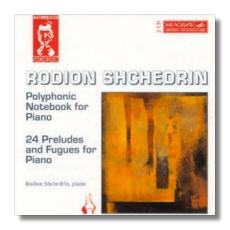
The Internet's Premier Classical Music Source
Related Links
- Latest Reviews
- More Reviews
-
By Composer
-
Collections
DVD & Blu-ray
Books
Concert Reviews
Articles/Interviews
Software
Audio
Search Amazon
Recommended Links
Site News
 CD Review
CD Review
Rodion Shchedrin

Polyphonic Notebook
24 Préludes and Fugues
Rodion Shchedrin, piano
Recorded in Moscow in 1973, 1966, and 1971
Melodiya/BMG 74321 36906 2 2CDs ADD 155'
The Polyphonic Notebook, subtitled 25 Polyphonic Préludes, owes a lot to Bach and the baroque style as sources for the pattern and organization of the notes. And that's pretty much where the similarities end. In these exercises Shchedrin displays no ear for melody as it might be sung. The thematic material is all very dry and academic, chosen perhaps to illustrate a point, but in a way that gives no pleasure. By contrast, even the most didactic works of Bach – the Art of Fugue and the canons - can be enjoyed both as music and as examples of compositional technique.
The whole set strikes me as little more than an intellectual exercise, with much analysis going into it and very little feeling coming out. The effect is flat and arbitrary, like technical illustration. The composer, in the notes to this release, writes that the Notebook is "designed as a kind of brief pianistic compendium of all the examples of polyphonic writing familiar to me." That is perhaps why it sounds like a catalog.
Shchedrin seems to play nearly every one of these Préludes as a stretto. In another recording, on the defunct Art & Electronics label, Alexander Malkus has the advantage of better sound and adopts a more fluid and relaxed approach. This helps make it possible for me to enjoy listening to these pieces. The composer's performance, while impressive and definitive, does not.
These works are complex; they show great technical skill and a variety of compositional tricks, but it's hard to see much in them beyond this. It is curious that these strict forms are used at all in the second half of the twentieth century. Perhaps it is a comment by the composer on his situation, the regimented and arbitrary character of life under Soviet rule in the late 1960's.
So much for the Polyphonic Notebook. The Préludes and Fugues are better. They use a range of neo-baroque forms and gestures and still turn out sounding very modern.
Considering that Shchedrin trained at the Moscow Conservatory, it is surprisingly difficult to hear much that is characteristically Russian in these pieces. This is in contrast to the other set of 24 Préludes and Fugues from the Soviet era, that written by Dmitri Shostakovich. The Shostakovich has far more depth and range of feeling than Shchedrin is able to express, and it is very Russian. From the tolling of the monastery bells to the long, dark, melancholy lines, Shostakovich's music is wired into both the Mighty Handful and the Russian soul. Shchedrin does draw a little from these sources and he acknowledges Shostakovich as the inspiration for this set.
Ultimately, Shchedrin is a paradox, fascinated with the forms of the past but disconnected from the spirit of his forbears. This music is merely a shadow of something much greater.
Copyright © 1997, Paul Geffen


















